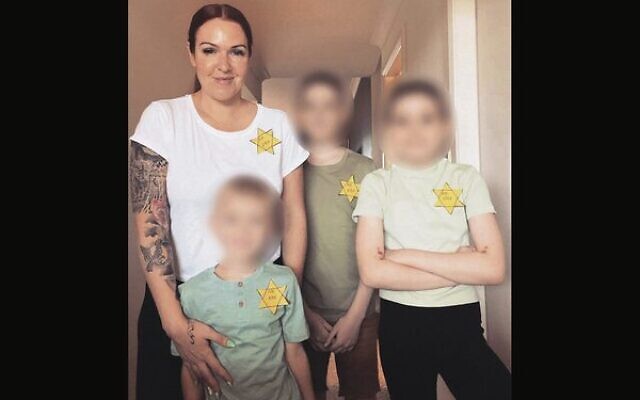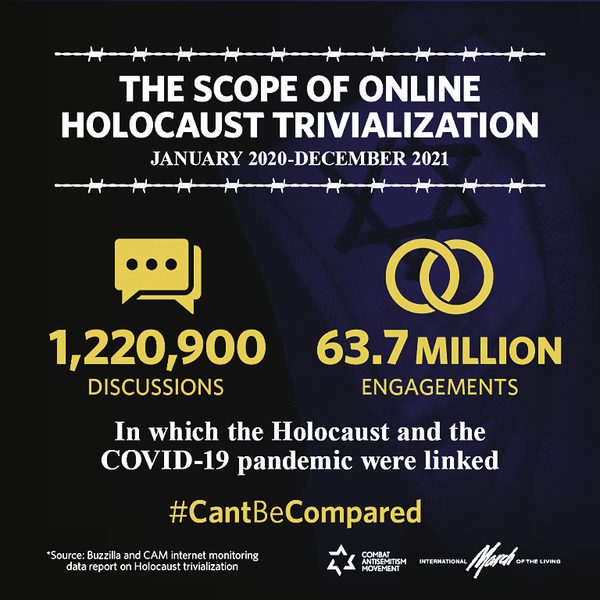Campaign against Shoah trivialisation launched
Over 60 million instances have been found where Holocaust and COVID-related terms were linked.

Australian Holocaust survivors have joined an international campaign to combat “Holocaust trivialisation” in the wake of a report looking into COVID-19 protesters’ use of Shoah references and imagery.
There has been “despicable appropriation” of the Holocaust by protesters, according to a study commissioned by the Combat Antisemitism Movement (CAM) ahead of International Holocaust Remembrance Day.
Researchers trawled content published online from 2020-2021 for keyword combinations such as “quarantine” and “concentration camps”; “vaccination makes you free”; and “Mengele” and Pfizer chief “Albert Bourla”.
They found over 60 million instances where Holocaust and COVID-related terms were linked.

In response, CAM has launched a #CantBeCompared campaign, in partnership with the International March of the Living.
“It is horrific to see the comparison of the pandemic to the Holocaust,” said Brisbane-based survivor Dr Peter Kraus. “I worry about keeping Holocaust memory alive.”
The retired obstetrician-gynaecologist, who has written a book about his experiences titled Slow Train to Auschwitz, added, “The Holocaust cannot be compared to anything in terms of its scope and horror, however, the message of the danger of hate has already been ignored.”
Speaking to The AJN, Budapest-born Dr Kraus said he appreciates that protesters “feel strongly … so they make these comparisons”, and recognised there wasn’t necessarily malice involved.
“I think it’s a measure of how much we need to do whatever education we can about the Holocaust,” he added.
Dr Kraus said he would ask people drawing parallels between the Shoah and COVID measures “to look up the Holocaust, and see if they really think anything happening in our country today is really anything on that scale”.
“They’re not trying to minimise the Holocaust, they’re trying to maximise their protest,” he noted. “But it does … have that effect.”
The sentiment was echoed by Courage to Care NSW chairman Eitan Nieshlos, founder of the Nieshlos foundation, a strategic partner of the International March of the Living. “The trivialisation of the Holocaust – an unparalleled human catastrophe – both dilutes and distorts vital historical lessons necessary to prevent such an event from ever happening again.”
International March of the Living president Phyllis Heidemann concurred. “Holocaust trivialisation is a gateway to outright Holocaust denial, and we must act decisively against it,” she said.
Melbourne’s Nina Bassat – one of the few child survivors of the Lvov Ghetto – reflected on anti-vaxxers who wear yellow stars or striped pyjamas as a sign of protest. “The problem is not only the hurtful appropriation of Shoah symbolism, but it is also, and even more so, the distortion of it,” she said.
“Jews were not having their freedom taken away, when they were wearing a yellow star, they were at risk of being killed. They were not having just their freedom taken away when they were in Auschwitz in striped pyjamas; they were a second or a millisecond away from death.
“Lockdown is not exactly being in the ghetto scrambling for potato peels or being in a concentration camp, wondering if you’ll survive the night in the cold with the hunger and the disease.”
Bassat, who has served as president of both the Jewish Community Council of Victoria and the Executive Council of Australian Jewry, lamented, “What it really highlights is the complete and utter ignorance of what the Holocaust was because in order to make those comparisons, it shows no knowledge whatsoever.”
In a comment penned last year, Dr Simon Holloway, head of education at the Jewish Holocaust Centre, concurred. “The recent proliferation of Holocaust-related imagery in relation to COVID restrictions is deeply disturbing. While we appreciate that many people are angry and upset … this particular analogy creates a false equivalence that impedes a proper appreciation of history,” he said.
“We encourage people to learn more about the Holocaust and expect that, in so doing, they will cease to invoke it in so frivolous a manner.”
Watch the CAM video. Join the campaign at holocaust.combatantisemitism.org. Follow CAM on Twitter.

comments